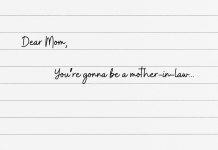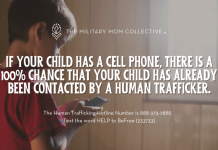
I was in the pediatrician’s office the other day getting my son’s 4-year-old checkup. He was happily playing in the “laundry” area of the waiting room—moving fabric from the pretend washer, then to the dryer, then ironing it with the wooden iron. He plays there every time we visit. I love watching him and imagining him as a grown man doing laundry for his family. He also is my baby, so while he plays, my hands are empty — no little baby sibling is demanding my attention. No struggle.
On this particular day, there was a new mom struggling to fill out tons of paperwork. Her baby was new—it still had that newborn cry that sounds sort of like a tiny pterodactyl. And her baby was crying—really screaming. She was bouncing and holding the baby and trying to fill out papers and visibly pouring sweat. I could see the tension radiating off of her.
Should I offer to hold that baby? I thought. Is that really creepy?
While I debated with myself, she finished her paperwork and sat down next to me. Then she pulled out a little baggie of breast milk. She asked the receptionist if there was anywhere she could heat up the milk. The receptionist told her that, yes, there was a microwave and sink in back. She could use it when they called her back for her appointment. It wouldn’t be long.
New Mom looked dejected and sat down again trying to comfort her baby. But Baby was NOT having it. Finally, after a few minutes of sad screaming by New Baby, the receptionist said she could go back early and heat up the milk. New Mom gratefully went back with the baggie and her baby, and returned a minute or so later. She opened a bottle from her diaper bag and looked like she was trying to balance the baby while opening a baggie of breastmilk to pour into the bottle.
Finally, I decided I’d just be creepy. I thought New Mom might cry at any minute. So I said, “Can I help you?”
She looked so relieved. “Yes! Please!” I thought she’d hand me the baby, but she handed me the bottle and the breast milk. I carefully (oh-so-very-carefully) poured the milk into the bottle, closed it, and handed it back to her.
Immediately, the baby stopped crying as she ate her milk. New Mom’s shoulder’s relaxed, and the waiting room fell to a hushed silence. The nurse came out, called New Mom back, and before she left, she turned to me and said, “Thank you. I haven’t gone out by myself with the baby before. I really underestimated how much work this would be.”
Then, as if anyone had asked, the only other woman in the waiting room shared her opinion. She said with a huff and an eye roll, “Oh please. Try having twins and then tell me you have it hard.”
What the what?
I looked at Other Mom sitting there with her child. She was alone with only one kid. Her child was reading a book—the child was probably in the fourth grade or so. Do I believe she has twins? Yes. Do I think it must be harder to handle two babies rather than one? Absolutely. Are kids hard work at any age? Ohmygoodness yes. My middle-schooler tries my patience every day.
But you know what? Just because your struggle might have been bigger does not diminish this mom’s struggle.
Just because you have had it “worse” does not mean no one else has the right to have stress, be sad, or feel overwhelmed.
I sat alone in the waiting room with Other Mom. Both of our kids were silently entertaining themselves. I made a pledge right there and then to feel empathy when someone struggles.
Let’s not be the type that looks at people struggling and decides to play “who-has-it-worse.”
We’ve all been there.
When someone complains to us that their spouse went out of town for work for the first time in their marriage without considering that your spouse has been gone for 3 months already with 5 more months to go …
When someone posts on social media that they just need a break from their kids when you know their parents watch their kids every Friday night for a date night and your closest family is 1,500 miles away …
When your college-aged sister says she is tired when you have three children under 5 years old …
Just because we perceive someone else’s struggle as somehow less than our own does not mean that he or she is not struggling. To that person, this situation is a struggle. I am a huge believer that we are given just enough grace to handle the situations in our life. When we see someone struggling with something we’d consider “easy,” let’s not compare struggles.
Let’s reach out and say, “How can I help?”
Let’s bring them dinner and stay to chat while they eat.
Let’s be a listening ear.
Instead of saying, “Oh please, I had it way worse,” let us say, “I know. It is so hard.”
Let’s lend a hand to help each other out of low places.
We need each other.










